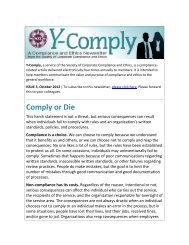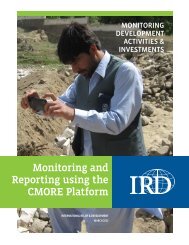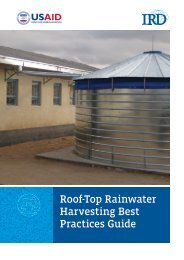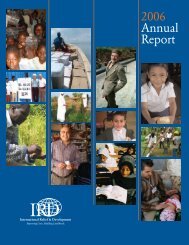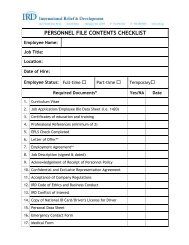Empowering citizens Engaging governments Rebuilding communities
Empowering citizens Engaging governments Rebuilding communities
Empowering citizens Engaging governments Rebuilding communities
Create successful ePaper yourself
Turn your PDF publications into a flip-book with our unique Google optimized e-Paper software.
“[Colonel John Charlton] was the first<br />
person who bought into what CSP was<br />
intended to do. And that has to be stressed,<br />
that the military must buy into it”<br />
—Travis Gartner<br />
2<br />
A complete stabilization package<br />
would set up a smaller area of operations with a joint<br />
security station. The area could be as small as five<br />
city blocks, its total coverage often dictated by the<br />
military presence needed to clear and hold it. “The<br />
military’s idea was that you’d take over an abandoned<br />
house or compound, turn it into your safe house,<br />
secure it, and then start doing missions,” Wilson said.<br />
“But we also had to build relationships with the local<br />
leaders. We prioritized different quick-reaction projects,<br />
stabilization, COIN-type spending. We did a lot of<br />
that in the early days, like the trash cleanup. But you<br />
know, right after fighting, we didn’t have the capacity<br />
to do it on the right level, or with a local face. We filled<br />
the gap until a better option came along. That’s when<br />
CSP came into the mix.”<br />
By November 2006, the Marines had seized a multistory,<br />
dilapidated building at a key vantage point in<br />
Ramadi. Dubbed the 17th Street Security Station, the<br />
building became a critical outpost for US and Iraqi security<br />
forces. With an operational security base established<br />
for the military to hold the surrounding area,<br />
the exact window of opportunity CSP was designed for<br />
opened up. The CSP team and local Iraqi leaders came<br />
together to implement a joint revitalization project to<br />
clean streets, reconstruct buildings, and repair sewage<br />
and electrical lines. The $2.1 million infrastructure<br />
project filled holes in the road and repaved sidewalks. It<br />
created hundreds of local construction jobs. While that<br />
was ongoing, IRD moved quickly to award more than 60<br />
business grants to local entrepreneurs to encourage<br />
investment in the rebuilt market and create longer term<br />
employment. “CSP was looked at by the military as a<br />
great partner,” Wilson said, “because they were willing<br />
to take risks and make things happen. If they had<br />
slowed down and said, ‘Hey we can’t do this because of<br />
X, Y, and Z,’ I don’t think you would’ve seen the drastic<br />
turnaround you saw in Ramadi.”<br />
Colonel John Charlton, commander of the 1st Brigade<br />
of the 3rd Infantry Division, headquartered in Ramadi,<br />
was a vocal advocate for COIN-style community stabilization.<br />
In the 2008 Washington Post examination<br />
of the Commander’s Emergency Response Program<br />
(CERP) funds and revenue for reconstruction, Charlton<br />
reiterated the need “to win [Iraqi] trust” and the<br />
importance of investing in <strong>communities</strong> in tandem with<br />
securing the <strong>communities</strong>. “He was the first person<br />
who bought into what CSP was intended to do,”<br />
Gartner said. “And that has to be stressed, that the<br />
military must buy into it.”<br />
IRD’s strong local ties in Baghdad, and the organization’s<br />
adeptness at establishing community rapport,<br />
clearly played in CSP’s favor. “The IRD network in<br />
Baghdad and in the other provinces, especially in<br />
the very critical years of 2006 and 2007, was a<br />
difference-maker,” said Alaa Ismael, who oversaw<br />
CSP’s infrastructure and essential activities. “In<br />
some of the districts we were working in, in which so<br />
many violent incidents happened, sometimes even<br />
the military found it very hard to work there. . . .<br />
Through our local networks, we were able to move<br />
into very dangerous <strong>communities</strong>. We were able to<br />
face those challenges because our staff was there<br />
on the ground.”<br />
The heart of the insurgency was in Al-Anbar, and<br />
employing many people right away was the only option,<br />
Gartner said, to hold gains as they were made in<br />
places like Ramadi. “The military is about to clear, and<br />
we’ve got resources, and they understand that we’re<br />
going to work with the municipalities and that we’re<br />
going to employ Iraqis,” he said. “So they buy into<br />
this, because they know it has to happen, and then<br />
they don’t have to do it. Colonel Charlton kept asking,<br />
‘Where are your expats?’ Well there were no expats.<br />
There was me and $60 million in CSP funds. And I<br />
kept stressing to him point number one: that I would<br />
work with the Iraqis, and that we were gonna employ<br />
a lot of people, local people.” According to Wilson, the<br />
military “loved what CSP and Gartner were doing. They<br />
32


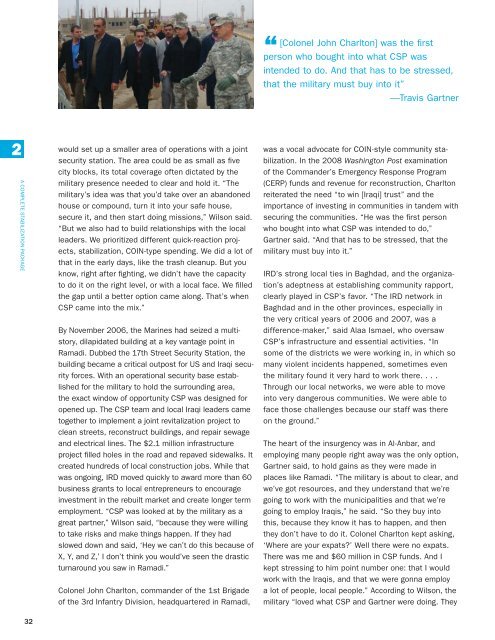
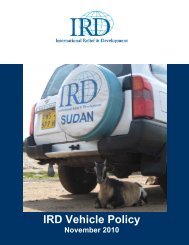
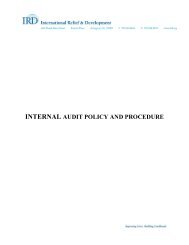
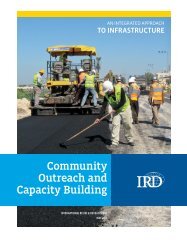
![Guide bonne pratique production d'oignon qualité_VF_4_2411012[1]](https://img.yumpu.com/23506639/1/184x260/guide-bonne-pratique-production-doignon-qualitac-vf-4-24110121.jpg?quality=85)

